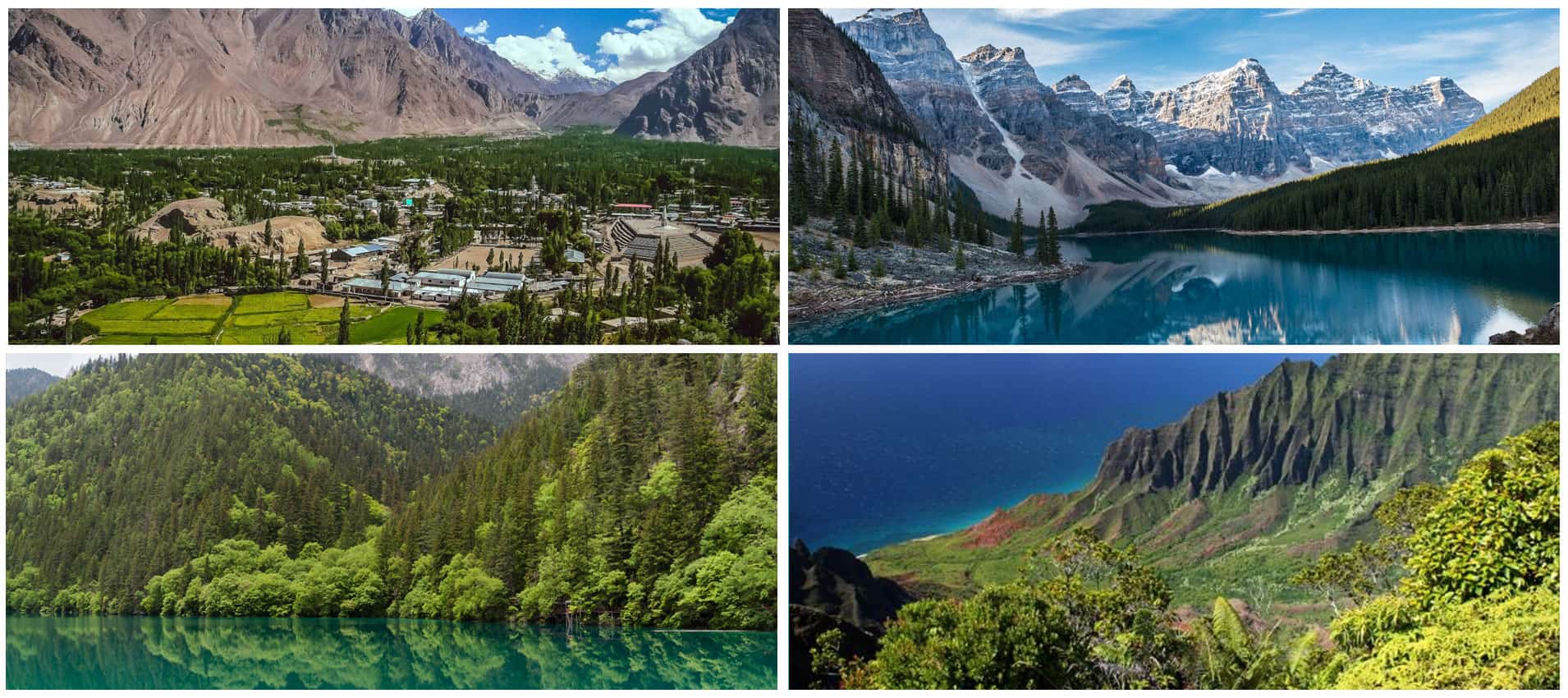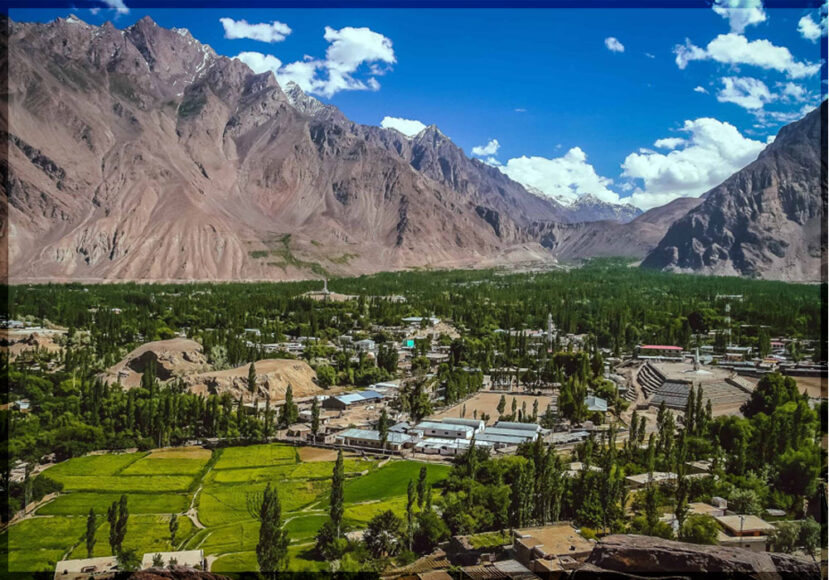Valleys are gaps or valleys of different heights on land, usually accompanied by mountains, flowing rivers, dense forests, and other dense vegetation.
Valleys In The World That Are Worth Visiting
Contents
We have created a list of the most amazing valleys in the world that you can visit once, and become an unforgettable experience of your lifetime.
Here are some of the most breathtaking valleys on earth.
Skardu Valley, Pakistan
Located in the Gilgit-Baltistan region of northern Pakistan, this picturesque valley is 7,300 feet (2,225 meters) above sea level, with cool springs, blue waters of the Indus, and towering mountain peaks. Moreover, the long stretch of the majestic valleys extending to Baltoro, Gyari, and Gyong in the Siachen area also contains impressive glaciers. The 2.5 kilometers (1.5 miles) beautiful natural Satpara Lake in the area is located at an altitude of 2,600 meters, about 9 kilometers (5.5 miles) north of Skardu. Also, serves as the main source of drinking water, hydropower, and surface irrigation. The valley is usually covered by snow in winter and the main road is closed for several days.
With the delicious fruits grown in the area, several historical sites. Including the pleasant climate of one of the many lakes in the area. This destination is a little-known paradise on earth. As a major tourist and trekking center, there are four peaks with an altitude of over 8000 meters nearby.
Some of which are the highest in the world, including the world’s second-highest peak K2, as well as Broad Peak, Gasherbrum, and Nanga Parbat peak. In summer, visit Lake Kachura, Mantokha Falls, and the cold Sarfranga Desert, and visit Fort Shigar and Buddha Rock in Skardu because of their historical significance.
The valley is a true gift of nature, offering unique features, unforgettable views, and various landscapes. Since most of them are easily accessible to humans, one can cherish the time spent with relatives. Or if he seeks solitude, spend time on one of the greatest and most memorable adventures in life.
Valley of Ten Peaks, Canada
The Ten Peaks are located in Banff National Park in Alberta. It is surrounded by the Canadian Rockies and 180 kilometers west of Calgary. Additionally, their jagged shadows are reflected in the clear blue waters of Moraine Lake where they are located. From the angle of the valley, you can also see several overhanging glaciers, which add to the scenery a lot. The peak time to visit is between May and August, but it must be remembered that a permit is required to enter the park. The flora and fauna are abundant, and traffic congestion hurts the area. From the introduction of invasive species to animals crossing highways.
Described as an unforgettable experience of a lifetime, 3,927,557 tourists visit Banff National Park every year. Many of whom flock to Moraine Lake in the summer. The park is crossed by the Trans-Canada Highway and can also be easily reached from Banff. Moraine Lake Road leads from the park to the valleys. The crystal clear emerald waters gleam on the mountain peaks, which contain the third-highest view of the Rocky Mountains. It is an ideal place for hiking, climbing, kayaking, sightseeing, and wildlife watching. Many people choose to camp on the spot. In winter, cross-country skiers often cross the area.
Jiuzhaigou, China
Located on the edge of the Qinghai-Tibet Plateau, Jiuzhaigou has been listed as a UNESCO World Heritage Site since 1992 and a World Biosphere Reserve since 1997. Jiuzhaigou is a 72,000-hectare rugged valleys in northern Sichuan Province and has the highest peak in southern Minshan. . 4, 800 meters. It has stunning landscapes, nestled in a series of narrow cone-shaped karst terrain, limestone terraces, multi-level waterfalls, blue, green, and purple lakes and ponds, caves, and snowy peaks. The region’s diverse forest ecosystem has about 140 species of birds flying over the valley. As well as many endangered animals and plants, such as giant pandas and Sichuan takins.
The well-preserved remains of Quaternary glaciers highlight the beautiful scenery of Jiuzhaigou. Unfortunately, the beauty of the area is naturally affected by forest activities, as many measures have been taken to restore the lost valuable materials. Through tree planting, strict management, and protection of water, air quality, and forests. Although to protect the precious natural life in the valley, it is hoped to limit human interception in the area. Although the consequences of the ecological footprint must be carefully considered, the scenic scenery has not been banned.
Kalalau Valley
It is located on the Nā Pali coast of Kauai in Hawaii, the Kalalau Valley. Kalalau Valley is said to be one of the greatest natural wonders on earth. Moreover, it shows a remote beach flanked by towering peaks and is the island’s cathedral. Almost from the beginning, this valley has been valued for its beauty. As a densely populated historical place, until the 20th century, there has been a large and prosperous community here. After which only licensed people were allowed to occupy the “uncontaminated” soil. This trail takes 90 days to complete, and if you are willing to show off some exercise by taking a few days of 11-mile hiking from Key Beach (including overnight camping), you can see the ancient canyon.
The first step to reach the valley is to walk two miles to Hanakapi’ai Beach, where you must cross the Hanakapi’ai Stream, which is famous for floods that cause rapid rises in water levels. The crawler track started at the seventh mile of the road. This is a narrow sidewalk, surrounded by mountains, steep slopes, and rough seas forming a huge gap. Only in fine weather, those who are suitable for cat-like instincts and grace, longing for connection with nature, self-reflection, and relaxation from the city, you should start. Walking on the hidden trails in the tropical rainforest, relaxing by the sea, and spending the night under the stars are all unforgettable journeys. Anyone can tour by boat or helicopter.
Romsdalen Valley, Norway
The view of this beautiful wild valleys, the floor is planted in a long narrow granite gorge, flanked by the frothy Rauma River. That is one of the most photographed natural landscapes in the country. The towering mountain range contains Trollveggen at 1,000 meters, the highest vertically overhanging rock face in Europe. The river passes through a 30-40-meter deep gorge in Verma Village and collapses into the Slaitafüssen Waterfall. The waterfall is fenced and has a bridge for a perfect view of the scenery.
You can see peaks like Romsdalshorn, Kungen, Druningen, and Bispen in the valley at 1,555 meters above sea level. The Romsdal mountain range has the most difficult climbing route in the world, and it is also the birthplace of Nordic rock climbing. At the foot of the Trollveggen mountain, there are picnic areas, cafeterias, souvenir shops, toilets, and children’s play areas. As well as Trollveggen Besøkssenter, all located on the E 136 highway, with magnificent mountain views.
La Gran Sabana, Venezuela
Located in southeastern Venezuela is the La Gran Sabana or Greater Savannah region, covering an area of 10,820 square kilometers (4,180 square miles). Also, a part of the Canaima National Park, the second-largest national park in Venezuela. The valley is also part of Guyana’s savanna ecoregion, which includes the Guyana Highlands and part of the Bolívar State, extending to the border with Brazil and Guyana. Known for its impenetrable biodiversity-rich jungles. There are also large rivers, waterfalls, canyons and canyons, and isolated tabletop terraces, known as tepuis or plateaus.
The area has historically been affected by erosion, elevation, and inclination, resulting in an inverted sandstone layered topography. The highest of which is the Tipuy Roraima plateau in Gran Sabana, which is approximately 2,800 meters (9,200 feet) above sea level. These ancient, randomly distributed rocks in Gran Sabana are typical of the Guyana Plateau. Where rocks and sandy soil support high-altitude savannas, dense forests in depressions, and dense forests through which rivers flow. El Dorado hikes from 200 meters to 1,500 meters (660 to 4,920 feet) down to Santa Elena de Uairén Road. The distance less than 30 kilometers (19 miles) is called “La Escalera” or stairs.
Thorsmork Valley, Iceland
The lush oasis of moss, ferns, and birch trees contrasts sharply with the jagged, snow-covered peaks on the horizon. Including raging glaciers unbridled across the black desert, showing the original glory of Þórsmörk. Although it is savage, it feels good, a quiet place to live with nature, and warmth from other parts of the country. The climate is mild, and the warm air rises from the ground and collides with the cool icy wind above, forming mist around the mountains. A lot of rain in this area helps the lush vegetation in the center of the valley to flourish.
When the pagan Thor, struck with his hammer Mjölnir, a “Thor Valley” was created in the southern highlands of Iceland between Tindfjallajökull and the famous glacier Eyjafjallajökull, with Mýrdalsjökul behind. There are also Krossá, Þröngá, and Markarfljót rivers, which comfortably embrace the beautiful paradise islands. You can hike the endless trails from there to reach the site, or you can hike on the Laugavegur Trail. Geological wonders, including the view of the crater volcanic mountain directly above the valley and the adjacent glacier view, are guaranteed.
Yosemite Valley, USA
This 4,000-foot-deep ice canyon is one of America’s most important landmarks and natural wonders. Cliffs rise along the edges, including polished ice-carved boulders, which are the true jewels of Yosemite National Park’s crown. Known as the “incomparable valleys”, it is indeed, especially in the early morning mist and sunset, the famous half dome presents an unforgettable pink glow. The 7,214-foot piece of granite can be admired from Glacier Point, an hour’s drive away. It straddles the valleys and the cloud rest, Liberty Cap, Spring, and Nevada Falls in the surrounding high mountains.
Although the area is home to black bears, deer, and squirrels. There are also dentist offices, prisons, courts, car repair shops, and churches, as well as new accommodations, campgrounds, and restaurants. As well as other guest services that continue to emerge. Those who prefer to reconnect with nature instead of participating in organized activities. They can do some hiking or biking trails along the many paved bike paths that lead to Jinghu Lake and other valuable attractions. The famous Yosemite Falls, Sentinel Falls, and Ripon Falls are nearby.
Valley of Geysers, Russia
It was recently used by reserve worker TI Ustinova and laboratory assistant AP Kruppenin on July 25, 1941. Near the extension of the volcano called the Eastern Volcanic Belt, the Geyser Valley in Petropavlovsk-Kamchatsky is 180 kilometers northeast. The first validator was discovered a few months ago. This 400-meter-deep, 4-kilometer-long, 8-kilometer-long gorge is connected to the Geyser River. There are more than 40 geysers and many hot springs within a circumference of 6 kilometers.
There is also a warm terrestrial ecological trail in the center, from which you can observe pulsating boiling springs, hot lakes, geysers, mud ponds, mud volcanoes, and steam streams. The exploding geyser must be very large and requires certain thermodynamic conditions. There are only 5 places in the world.
June 3, 2007, at 2:20 pm. The largest historical landslide on the Kamchatka Peninsula, covering many beautiful waterfalls, geothermal land, and thermal facilities. It started when the steep slope of the Vodopadny (waterfall) stream broke, breaking in the main body of water, snow, blocks, various debris, and at 35 -40 km/h speed and uprooted trees along the way. The second “dry” part of the incident occurred within the next three minutes. When the head of the river ruptured, causing more bulk material to wash down the river to form a dam and a 150 max 800 m wall. However, the debris extended by 1.7 kilometers.
Valley of Flowers, India
Last on the list is the Valley of Flowers in India. This high-altitude site is located at the divergence of Zanskar and the west and east of the Himalayas. It is about 11,000 feet above sea level and is surrounded by jagged peaks. During the hot months from August to September, when you encounter many exotic plants in the area, you may be at a loss. Including dwarf irises, dwarf plants, dwarf rhododendrons, primroses, and ferns, and hundreds of plants. Plant other blue poppies in the wild ocean. Thousands of shrubs, flowers, and other plants of various colors create a multi-textured blanket against the backdrop of the stunning Himalayas. Which is a treat for botanists, climbers, and amateurs.
After Frank Smith completed his expedition and descended from the slopes of Mount Camet in 1931, he discovered and named the canyon. Moreover, the trip from Govindghat to Ghangaria is famous for seeing the climax of blooming wildflowers. Overcoming the awe of the colorful carpets facing the flower-blooming fields and snow ridges. one will also notice the glittering glaciers nearby. The Pushpawati Stream, a tributary of the Alaknanda River, crosses the valleys and doubles the effect.
Furthermore, the annual monsoon keeps the soil dormant and fertile until it blooms again. In the colder months, people cannot enter the snowfield where precious seeds are hidden indoors and under the snow.



